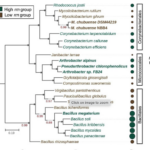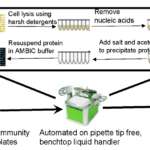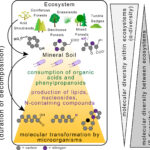 Lawrence Berkeley National Lab
Lawrence Berkeley National Lab
Environmental Genomics & Systems Biology
Environmental Simulations Science Lead
trnorthen@lbl.gov
(510) 486-5240
The Northen Lab’s research is focused on understanding how microbial communities are structured by the biopolymers and metabolites in their environment and the dynamic and reciprocal processes by which they transform these pools. Central to these efforts are the development and applications of mass spectrometry approaches to characterize both temporal and spatial metabolic processes. As the Environmental Simulations Science Co-Lead, Dr. Northen helps coordinate next-generation experimental approaches to decipher microbial community interactions, community structure, metabolism, gene functions, and regulation.
In particular, the Northen lab is developing and applying exometabolomic platform technologies to support the characterization of organics at our field site, to identify the various carbon sources supporting microbial growth. This is done by using LC-MS/MS-based metabolomics to characterize the native substrates for microbes, use this information to make media for microbial characterization, and measure how microbes transform these field-relevant substrates. This provides essential information to predicting the range, interactions and to couple community with environmental dynamics. A major effort will be using exometabolomics and metaproteomics to characterize the syncomps, including using stable isotopes. We have recently used this approach to test predictions of substrate use using simple synthetic communities (https://doi.org/10.1101/2021.05.12.443848). We are working with the ENIGMA team to expand these capabilities and extend them to other communities that capture key aspects of our field site. Critically, we are also working with ENIGMA scientists characterizing field communities to iteratively refine our synthetic communities and predictive models through comparison with field observations. This will provide our program with critical insights into who is doing what within the community, how environmental conditions constrain the range and activities of field communities, and how resources are being partitioned to drive key field processes (e.g., denitrification, metal reduction, etc.).
Relevant Publications
 Microbial Remains Shape Community Composition and Growth of Soil Microorganisms - The Science Microbes, which include organisms like bacteria, are tiny living things that inhabit virtually every environment on Earth. Soil microbes play a crucial role in breaking down organic matter and are crucial drivers of global nutrient cycles that support all terrestrial ecosystems. ENIGMA scientists studied what happens when these microorganisms die and leave behind remains known as necromass. After… More →
Microbial Remains Shape Community Composition and Growth of Soil Microorganisms - The Science Microbes, which include organisms like bacteria, are tiny living things that inhabit virtually every environment on Earth. Soil microbes play a crucial role in breaking down organic matter and are crucial drivers of global nutrient cycles that support all terrestrial ecosystems. ENIGMA scientists studied what happens when these microorganisms die and leave behind remains known as necromass. After… More → Bacterial community composition impacts the transformation of carbon in soils - Microorganisms have evolved various life-history strategies to survive fluctuating resource conditions in soils. However, it remains elusive how the life-history strategies of microorganisms influence their processing of organic carbon, which may affect microbial interactions and carbon cycling in soils. Here, ENIGMA researchers characterized the genomic traits, exometabolite profiles, and interactions of soil bacteria representing copiotrophic and oligotrophic strategists. I More →
Bacterial community composition impacts the transformation of carbon in soils - Microorganisms have evolved various life-history strategies to survive fluctuating resource conditions in soils. However, it remains elusive how the life-history strategies of microorganisms influence their processing of organic carbon, which may affect microbial interactions and carbon cycling in soils. Here, ENIGMA researchers characterized the genomic traits, exometabolite profiles, and interactions of soil bacteria representing copiotrophic and oligotrophic strategists. I More → Novel Protocol Leverages Automatic Liquid Transfer to Prepare Hundreds of Microbial Cell Cultures for Proteomic Analysis - ENIGMA researchers detailed a step-by-step protocol that consists of cell lysis in alkaline chemical buffer (NaOH/SDS) followed by protein precipitation with high-ionic strength acetone in 96-well format. This protocol, combined with previously established automated protein quantification and protein normalization protocols, provides a rapid, cost-effective method to prepare LC-MS proteomic samples from bacteria and non-filamentous fungi cell cultures. More →
Novel Protocol Leverages Automatic Liquid Transfer to Prepare Hundreds of Microbial Cell Cultures for Proteomic Analysis - ENIGMA researchers detailed a step-by-step protocol that consists of cell lysis in alkaline chemical buffer (NaOH/SDS) followed by protein precipitation with high-ionic strength acetone in 96-well format. This protocol, combined with previously established automated protein quantification and protein normalization protocols, provides a rapid, cost-effective method to prepare LC-MS proteomic samples from bacteria and non-filamentous fungi cell cultures. More → Decomposition Decreases Molecular Diversity and Ecosystem Similarity of Soil Organic Matter - ENIGMA researchers collaborated with the Lehmann Lab at Cornell University to find that microbial decomposition drives significant variability in the molecular richness and diversity of soil organic matter between soil horizons and ecosystems. More →
Decomposition Decreases Molecular Diversity and Ecosystem Similarity of Soil Organic Matter - ENIGMA researchers collaborated with the Lehmann Lab at Cornell University to find that microbial decomposition drives significant variability in the molecular richness and diversity of soil organic matter between soil horizons and ecosystems. More →